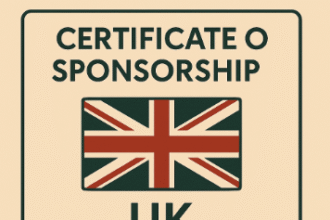Understanding the UK Skilled Worker Visa
The UK Skilled Worker Visa is a gateway for foreign nationals seeking employment in the United Kingdom. Introduced in December 2020, this visa replaced the Tier 2 (General) work visa, streamlining the process for skilled workers to come to the UK and fill job vacancies in various sectors. The primary purpose of the Skilled Worker Visa is to address labor shortages in the UK workforce by permitting skilled individuals from around the globe to contribute to the UK economy.
Eligibility for the UK Skilled Worker Visa requires applicants to meet specific criteria. Prospective candidates must have a confirmed job offer from a UK employer that holds a valid sponsorship license. The job must also meet the requisite skill level, typically set at RQF Level 3 or above, which corresponds to A-level or equivalent qualifications. Furthermore, applicants must receive a minimum salary level; currently, this threshold is set at £26,200 per year or the ‘going rate’ for the job, whichever is higher. This requirement ensures that positions filled by overseas workers align with fair wage standards and protect the labor market.
The benefits of the Skilled Worker Visa extend to both employees and employers. For workers, the visa offers a path to permanent residency after five years, allowing for stability and long-term planning. Additionally, it grants access to the National Health Service (NHS) and other public services. For employers, having access to a wider pool of talent helps to alleviate skills shortages in various industries, fostering innovation and growth. The company’s ability to sponsor workers can enhance its international reputation and attract talent from a diverse background.
The application process for the Skilled Worker Visa involves several steps. First, the employer must issue a Certificate of Sponsorship (CoS) to the candidate, which includes specific details about the job offer. Once the CoS is obtained, the applicant can proceed to apply for the visa online, offering required documentation and paying the application fee along with the immigration health surcharge. Overall, this visa program not only supports skilled workers but also strengthens the UK labor market through strategic sponsorship.
Types of Jobs that Qualify for Visa Sponsorship
The Skilled Worker Visa in the UK presents an opportunity for international professionals to seek employment in a variety of sectors. To qualify for visa sponsorship under this framework, job roles must meet certain criteria established by the Home Office, including being on the list of eligible occupations and complying with minimum salary requirements. Typically, roles that are in high demand and require specific skills and qualifications are more likely to be sponsored.
Healthcare professions represent a significant portion of jobs eligible for sponsorship. Positions such as doctors, nurses, and various healthcare specialists are consistently sought after due to the ongoing need for skilled individuals in the National Health Service (NHS) and private healthcare facilities. These roles often have specific qualifications that must be met, including professional registration, and the minimum salary threshold generally aligns with NHS pay scales.
Another prominent sector includes information technology and engineering, where roles like software developers, systems analysts, and civil engineers frequently qualify for sponsorship. These fields require advanced technical skills and cater to the booming digital and construction industries, thereby increasing the demand for international talent to fill skill gaps. The minimum salary for these positions often begins around £26,200, although this can vary based on specific job titles and locations.
Additionally, roles in finance, such as accountants, financial analysts, and investment managers, are also eligible for sponsorship. Employers in this sector often seek highly qualified candidates who can contribute to the dynamic landscape of the financial markets. The salary requirements for these professions typically start similarly to those in IT and engineering, depending on the complexity of the role.
In summary, the types of jobs that qualify for UK Skilled Worker Visa sponsorship are broad and include sectors such as healthcare, IT, engineering, and finance. Each of these sectors not only provides numerous opportunities for international workers but also requires adherence to salary and skill level criteria crucial for successful visa applications.
The Role of Employers in the Sponsorship Process
Employers play a crucial role in the sponsorship process for skilled worker visas in the United Kingdom. For an employer to sponsor a foreign worker, they must first obtain a sponsorship license from the Home Office. This license allows them to legally hire individuals from outside the UK. The application process for the license includes several steps, such as proving that the business is genuine, demonstrating a proven track record in their industry, and showing that they can meet the financial responsibilities associated with employing foreign workers.
Once the sponsorship license is granted, employers are required to adhere to specific compliance obligations. These obligations include maintaining up-to-date records on sponsored employees, ensuring the employees can do the job they were hired for, and reporting any issues or changes in the employment status of the sponsored worker to the Home Office. Additionally, employers must ensure that they are paying the appropriate salary levels as specified in the relevant occupation codes outlined in the UK’s immigration guidance.
A significant responsibility of employers is to conduct a Resident Labour Market Test in specific circumstances, which involves demonstrating that there are no suitable candidates within the UK for the position being filled. This test not only ensures fair recruitment practices but also establishes the employer’s commitment to hiring locally when possible.
Maintaining the sponsorship license requires ongoing compliance efforts from the employer. They must regularly assess their hiring practices, workplace culture, and ability to support sponsored employees. Failure to meet these obligations can result in the suspension or revocation of the sponsorship license, affecting not only the employer’s ability to hire foreign workers but also potentially leading to significant operational disruptions.
Identifying Employers Offering Visa Sponsorship
Finding employers in the UK that provide skilled worker visa sponsorship can seem daunting, but several strategies can streamline the process. Firstly, utilizing specialized job boards is essential. Websites like Indeed, Glassdoor, and LinkedIn have filters that allow job seekers to specifically search for roles that offer visa sponsorship. These platforms often highlight employers who have a proven track record and a valid sponsorship license, making it easier for candidates to identify potential opportunities.
Additionally, networking remains a vital component in job seeking. Engaging in professional networks or industry-specific groups, either online or through local events, allows candidates to connect with employers who may be willing to provide sponsorship. Attending career fairs and industry conferences can also create valuable face-to-face interactions, leading to employer connections. Networking isn’t just about who you know—it’s about leveraging these relationships to discover who is actively looking to hire candidates under the skilled worker visa scheme.
Recruitment agencies can also play a crucial role in this search. Many agencies specialize in assisting international job seekers and have direct contacts with companies that offer sponsorship. Registering with these agencies allows candidates to tap into their knowledge and networks, which significantly enhances the chances of securing roles that come with visa support.
Online resources further assist in identifying employers offering visa sponsorship. The Home Office maintains a database of licensed sponsors which is publicly available. By consulting this resource, job seekers gain comprehensive insight into companies authorized to employ those on skilled worker visas. Through diligent research and proactive networking, candidates can effectively identify and approach potential employers willing to support their immigration journey to the UK.
Crafting a Winning CV and Cover Letter for Visa Sponsorship Jobs
When applying for skilled worker visa sponsorship jobs in the UK, a well-crafted CV and cover letter are essential tools in your job search arsenal. Your CV should not only convey your qualifications but also highlight your suitability for the role and the unique perspective you bring as an international candidate. Start by tailoring your CV to the specific job you are applying for, which can significantly enhance your chances of catching the employer’s attention. Analyze the job description and incorporate relevant keywords that align with the skills and experiences that the employer is seeking.
It is important to structure your CV in a clear and professional format. Begin with a personal statement that outlines your career goals and the value you can add to the company. This section should be concise yet powerful, drawing attention to your key competencies. Follow this with sections detailing your work experience, education, and relevant skills, placing emphasis on accomplishments that reflect your ability to adapt and thrive in diverse environments, particularly within the UK context.
In addition, your cover letter serves as an opportunity to expand upon your CV and add a personal touch. Make sure to address your letter to the hiring manager, which requires some research. In the first paragraph, introduce yourself and express your interest in the position while mentioning how you discovered the vacancy. The subsequent paragraphs should emphasize your skills and experiences that directly align with the job requirements. Be specific about how your background offers valuable insights and innovation to the employer’s team, reinforcing the benefits of hiring an international candidate.
Finally, concluding your cover letter with a strong statement reiterating your enthusiasm for the position and your willingness to discuss your application further can leave a positive impression. By crafting a tailored CV and cover letter, you increase your chances of securing a position that not only acknowledges your skills but also offers the much-desired visa sponsorship.
Networking and Building Connections in Your Target Industry
Networking is an essential strategy when searching for skilled worker visa sponsorship jobs in the UK. Establishing connections with industry professionals not only enhances your visibility but also opens up opportunities that might otherwise remain hidden. A proactive approach to networking can provide insights into job openings, company culture, and the nuances of industry-specific requirements for sponsorship.
One of the most powerful tools at your disposal for effective networking is LinkedIn. This professional networking platform allows you to connect with industry leaders, join relevant groups, and follow companies that are willing to sponsor skilled worker visas. By crafting a compelling LinkedIn profile that highlights your skills and experiences, you can attract the attention of recruiters and hiring managers. Additionally, engage actively in discussions, share industry-related content, and reach out to individuals in your target field for informational interviews. This initiative showcases your commitment and interest in the sector, setting you apart from other candidates.
Moreover, consider joining professional associations related to your industry. These organizations often host networking events, workshops, and webinars that bring together job seekers and employers. Participating in such events not only expands your professional circle but also demonstrates to potential sponsors your dedication to continuous development in your field. Many associations also provide members with exclusive job boards where employers specifically look for candidates eligible for sponsorship.
Leveraging these networking strategies, particularly through platforms like LinkedIn and industry associations, can be highly beneficial in discovering skilled worker visa sponsorship opportunities. Remember, the strength of your network can significantly influence your job search success, enabling you to forge beneficial connections that may lead to employment in the UK.
Interview Preparation and Tips for International Candidates
Preparing for a job interview as an international candidate seeking a UK Skilled Worker Visa sponsorship can be a critical step in securing employment. Understanding UK workplace culture is fundamental. UK employers often value punctuality, professionalism, and the ability to engage in constructive dialogue. Researching the company’s values, work ethics, and team dynamics can provide insight into what the employer may expect during the interview process.
Moreover, it is essential to familiarize oneself with common interview questions typically posed by UK employers. Questions often revolve around the candidate’s past experiences, problem-solving capabilities, and understanding of the role for which they are applying. Candidates should anticipate inquiries such as, “Can you describe a challenging work situation and how you handled it?” or “What motivated you to apply for this position in our company?” Practicing responses to these questions can significantly boost confidence during the interview.
Demonstrating one’s skills in relation to the role is crucial. As an international candidate, articulating how your unique experiences and skill set can contribute to the company’s success presents a compelling case to employers. It is beneficial to utilize the STAR method (Situation, Task, Action, Result), which helps to structure responses effectively. This approach not only showcases skills and accomplishments but also illustrates adaptability to a new environment.
Furthermore, it is advisable to prepare insightful questions to ask the interviewer. Doing so demonstrates genuine interest in the position and the company while allowing candidates to gain a better understanding of the workplace. In preparation, candidates should also ensure they are well-versed in relevant industry trends and news, as this knowledge can provide valuable context during discussions.
In conclusion, thorough preparation for interviews with UK employers by understanding workplace culture, anticipating common questions, and emphasizing adaptability and relevant skills can significantly enhance an international candidate’s prospects for successful employment and attaining a Skilled Worker Visa. Proper preparation equips candidates with the confidence needed to navigate the interview process effectively.
The Importance of Understanding UK Work Culture
Understanding the UK work culture is paramount for international job seekers, particularly those seeking Skilled Worker Visa sponsorship jobs. The work environment in the UK is characterized by specific communication styles, teamwork dynamics, punctuality norms, and professional etiquette that shape professional interactions and influence career success.
One of the defining features of UK work culture is its emphasis on clear and concise communication. In many professional settings, directness is appreciated, and individuals are encouraged to express their views openly. However, it’s essential to strike a balance between being assertive and maintaining politeness, as respect for others’ opinions is a core value. Adapting to this communication style can be crucial for effective cooperation and relationship building in the workplace.
Teamwork is another significant aspect of UK work culture. Most organizations prefer a collaborative approach, where participation and input from all team members are valued. This culture promotes inclusivity, and understanding how to contribute meaningfully while fostering positive group dynamics can enhance one’s standing within the team. Additionally, acknowledging the contributions of peers and showing appreciation are essential practices that facilitate smooth collaboration.
Punctuality is also highly regarded in the UK job market. Being on time for meetings and appointments symbolizes professionalism and respect for others’ time. It is advisable for newcomers to adopt a punctual mindset, as lateness may be perceived negatively and can adversely affect professional relationships.
Lastly, professional etiquette plays a vital role in the workplace. Familiarizing oneself with acceptable behaviors, dress codes, and conduct within the specific industry can greatly influence job integration and overall performance. Understanding these cultural nuances not only assists in job acquisition but also fosters a harmonious working atmosphere, paving the way for career advancement and personal satisfaction.
Resources and Tools for Job Seekers Seeking Sponsorship
Finding employers willing to sponsor a UK Skilled Worker Visa can be a challenging endeavor, but various resources and tools are available to facilitate this process. Utilizing these resources not only helps streamline job searches but also enhances the understanding of the specific requirements and opportunities available to international workers in the UK.
One of the most comprehensive platforms for job seekers is the UK Government’s official website, which provides valuable information about visa sponsorship requirements and a list of licensed sponsors. This official resource allows prospective applicants to easily identify companies that are authorized to provide visa sponsorship, ensuring a targeted approach in their job search.
In addition to government resources, specialized job boards such as Jobs.gov.uk and S14s.com are dedicated specifically to jobs that offer visa sponsorship. These platforms provide a user-friendly interface where candidates can filter job listings by sponsorship availability, sector, and location. This tailored search capability enhances the likelihood of finding jobs that meet visa criteria.
Moreover, professional networking sites like LinkedIn can be instrumental in this process. By joining relevant groups and engaging with professionals in their industry, job seekers can discover exclusive job openings and sponsorship opportunities. Additionally, connecting directly with employers and reaching out to contacts can lead to valuable insights and recommendations.
Community organizations and support groups, such as Refugee Council and similar entities, also offer assistance in navigating the job market. These organizations provide valuable resources, including workshops, mentorship programs, and job fairs tailored to international job seekers, thereby creating a supportive environment for those pursuing sponsorship.



